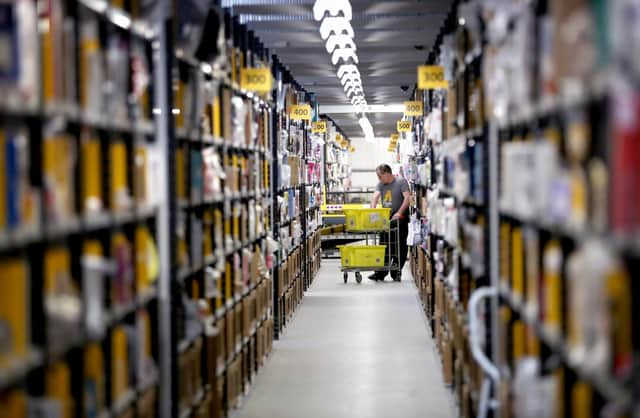Who in retail will flourish and who will fail in the wake of coronavirus? - comment


The headlines have been stark. 2019 had already been the worst year for retail for 25 years with overall sales down for the first time since 1995. UK retail sales in March were down by 5.1 per cent – the steepest fall since data collection began in 1996. Worse is to come in April and no recovery can be expected until the high street is fully reopen for business, which will be the autumn at best.
The figures mask very different fortunes, dependent on which sectors of retail are under scrutiny. As so often, when a left-field event is experienced, the impact is not evenly spread. Many retailers permitted to continue trading have bucked the trend.
Advertisement
Hide AdAdvertisement
Hide AdNon-food operators, however, which had to close their doors in mid-March, are still watching and waiting. Primark, for example, went from a business turning over £650 million a week to nothing. It does not trade online.
Some chains have already gone. They include Oasis, Warehouse, Debenhams, Laura Ashley and Cath Kidston, although some may retain an online presence. The British high street was already struggling, but the permanent closure of thousands of businesses, including many smaller independents, will likely follow.
Clothing retailers will face the added headache of dealing with unfashionable and unwanted stock. Suits and dresses have been exchanged for casual wear, with demand for lounge wear up 322 per cent. The winners include many who are trading only online, such as Amazon, which, according to some, already accounts for almost 20 per cent of all retail sales.
Dixons Carphone was struggling last year, but sales during lockdown have risen more than 165 per cent from increased movement of, for example, cookware, entertainment systems and even fitness trackers.
Within “clicks and bricks” food retailers, Tesco, for example, will soon have the capacity for 1.2 million home deliveries, up from just 600,000 before the pandemic hit.
Food retailers’ sales in general have risen sharply, on average by 9 per cent, driven initially by a short-lived surge in panic buying (for five consecutive days in March, Sainsbury experienced sales greater than their busiest trading day at Christmas) and latterly by the ongoing closure of fast food outlets and restaurants.
Space-invaders
Success does not come without a cost, however, as most stores open are incurring additional expenditure through infection control measures, such as Perspex screens and sanitising hand gel. The shopping experience presently is hardly a pleasure. Who is not irritated by the inevitable dimwit or deliberate rebel invading your space or heading in the wrong direction?
The appeal of home delivery is only too obvious. Once the older generations and other vulnerable groups embrace it, there will be no turning back. Looking beyond the gloom of the dire economic forecasts and a looming recession, those retailers who survive will need to recognise which are permanent changes in consumer behaviour and which are just temporary.
Advertisement
Hide AdAdvertisement
Hide AdCurrently, a third of shoppers say they will be more mindful, and will incur less waste. The same number say they will spend less on non-essentials. Unlikely! One in five say they will spend less going out. More likely. The lockdown period has seen an 89 per cent rise in the number of online registrations.
High streets will need to apply for a change of use, with fast food outlets among those who will need to change their ways. Shopping centres will do better and so may convenience outlets in residential areas, as folk decide to travel less. Offline retailers must engage with customers to keep the buying habit going where and how they can, with experience critical.
Health and safety concerns will nevertheless be reflected in ongoing in store restrictions. Social distancing is here to stay, and precautions will continue long after this pesky virus is beaten. Retailers will be expected too, to offer fair rewards to loyal employees.
Some 45,000 new workers were taken on at Tesco alone in April, including delivery drivers, shelf fillers and till operators, who should not be discarded as demand settles. Cashless shopping has been on the rise for many years and will only continue.
Lastly, shoppers will reward retailers that demonstrate corporate social responsibility and introduce more sustainable practices, supporting good causes, environmental wellbeing and even providing aid for their competitors. Amazon recently donated £250,000 to a fund supporting bookshops.
It is not unreasonable to say that little in retail will be the same again. Reputations have been made and lost in a matter of weeks. Sometimes it is luck that decides who wins and who loses, but fortune favours the brave and it is not always size that is the differentiating factor. The internet knows no bounds, even if in-store floor space may be limited. Ultimately, it may not be the size of the dog in the fight that matters, but the size of the fight in the dog.
A message from the Editor:
Thank you for reading this story on our website. While I have your attention, I also have an important request to make of you.With the coronavirus lockdown having a major impact on many of our advertisers - and consequently the revenue we receive - we are more reliant than ever on you taking out a digital subscription.Subscribe to scotsman.com and enjoy unlimited access to Scottish news and information online and on our app. With a digital subscription, you can read more than five articles, see fewer ads, enjoy faster load times, and get access to exclusive newsletters and content. Visit www.scotsman.com/subscriptions now to sign up.
Our journalism costs money and we rely on advertising, print and digital revenues to help to support them. By supporting us, we are able to support you in providing trusted, fact-checked content for this website.
Joy Yates
Editorial Director